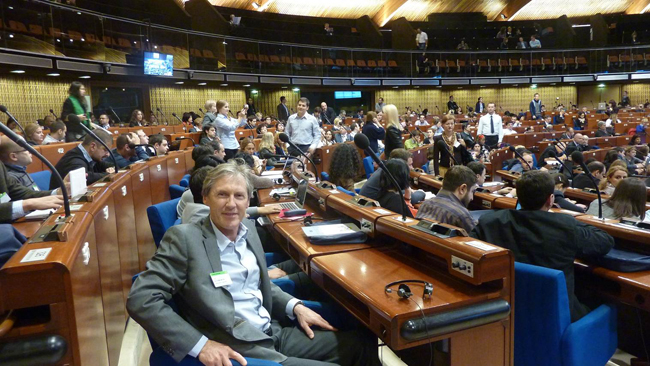WORLD FORUM FOR DEMOCRACY
at
THE COUNCIL OF EUROPE
Strasbourg 2012
BRIDGING THE GAP BETWEEN OLD MODELS AND NEW REALITIES.
May I start by thanking our hosts, the Council of Europe for making this conference a reality, allowing us all to share our experiences on this important topic.
I’ll open with a definition of democracy: it’s a way of organising ourselves for no other reason than for ourselves. As a consequence, if democracy is working, social cohesion is promoted.
Last Sunday, at the NGO forum, the 82 year old Albert Teveodjre, an eminent African public figure, opened the panel discussions with his definition: he said that democracy is about being able to say sorry and thank you, and it starts in the home, between husband and wife.
Then, of course, it extends out into the playground, the schoolyard, the workplace, etc.
However, democracy, as practiced today, does not encourage common ground and compromise. Election contests and campaigning are adversarial from the outset. Modern democracy today appears to be a sort of cartel: an oligarchy of competing political parties arguing and debating on whatever issue, with more focus on their electoral prospects than effective government. Nevertheless the good intentions of the politicians, the overriding imperative is for candidates to win and retain office at virtually any cost. With the demise of the great ideological positions of left and right, candidates too often pander to populist agendas or, worse still, manufacture their differences.
But it’s not the fault of the politicians: it’s a systemic problem.
In Australia, people are turned off by politics, at a level not experienced in living memory. Modern democracy is dominated by empty hyperbole and sloganism, so that as a result, good government has become the victim.
Many would regard Australia, like many of the countries of Europe, as an advanced democracy. The traditional institutions which have come to define Democracy seem to be functioning quite well – free and fair elections, an independent judiciary, a free press etc.
But why are we, as in Europe, so unhappy with our Democracy?
7 years ago, in 2005, together with some like-minded colleagues, I formed The newDemocracy Foundation. We felt that democracy needed to be reinvented to promote common ground. Two things seem to be lacking in the current model of democracy: better representation and better deliberation. We were fortunate enough to attract the support of ex-politicians: ex-premiers from both sides of politics as well as distinguished academics. There wasn’t any financial crisis at the time. We just felt that, if anything, democracy was in crisis. Modern democracy has degenerated into a ‘B’ grade high school debating society.
It does not encourage the very thing we need most of today: collaboration. Is it any wonder that people – young people in particular – have little faith in modern democracy?1
In 2009, our Foundation, together with the help of Australia’s peak research body, undertook the country’s first ever Citizens’ Parliament.
We asked 150 randomly selected citizens to deliberate on the question of how to improve our system of government. The citizens listened to expert practitioners and the deliberations were facilitated by professionals, over a period of several months.
We asked the citizens to rank their recommendations.
The first priority that the citizens wanted was to see State laws harmonized.
The second recommendation was that there should be more opportunity for the public to participate in politics.
All the recommendations were quite sensible.
There have been hundreds of forums of randomly selected citizens convened around the world, including in Australia, but not that many people are aware of them or how they operate.
There are 2 critical factors that make for successful citizen engagement or citizen assemblies:
Representation+deliberation
- Fair representation is only really achieved when the jury is randomly selected. Only with random selection can a truly representative group be obtained. The number of jury participants can vary. For practical purposes, juries of approximately 50 are usually sufficient, even though, statistically, a number up to 150 is ideal. In addition, a cross check ensures that the sample is representative of the demographic, in terms of age, gender and ethnicity. A per diem payment also helps attract those who might otherwise not be interested.
- The second critical factor is deliberation. Citizen jurors need time, space and accessibility to information. Having a period of 40 hours – say one week – spread over 3 to 6 months, makes it feasible for those citizens unable to take time away for their normal obligations. Providing a physical space to come together is important as well as providing access to reading material (and, if possible, the subject matter experts).
For those of us who work in the field of deliberative democracy, representation by random selection raises the most conjecture. How can a group of randomly selected citizens be a starting point for complex matters of government? Many people do not – cannot – believe that juries comprised of randomly selected citizens are capable of making sensible decisions.
The research evidence, however, is compelling. For a start, we all must recognize that, in many countries, juries are the ultimate arbiter in trials. Randomly selected citizen panels provide better judgment than so-called panels of experts. Why? Because the diversity that comes about through random selection brings different and varied perspectives. Moreover, as the citizens deliberate – listening to and accommodating the views of others – in a non-antagonistic and non-threatening facilitated forum, consensus is often achieved.
Not many people can believe this, as few have experienced such deliberations, particularly amongst groups of strangers of 30 or more. The deliberative tools that have emerged over the last twenty years, such as expert facilitators and café conversation formats, have yet to break into mainstream politics.
There is also a growing body of literature and practice which supports the use of random selection in government. In Australia, citizen assemblies/juries have yet to be enshrined in legislation but the prospects are promising. There are a few countries which have led the way: in the US, the State of Oregon has a law which requires a citizen jury to provide recommendations on referenda; in Italy, in Tuscany, large-scale urban developments have a jury process.
These and other precedents, within the structure of government practice, are important first steps to re-engaging with people. However, in our view, there exists the potential for more radical and beneficial outcomes. If we were to undertake another citizens’ assembly today in Australia, we would wish to have some more radical proposals presented to the citizens for their deliberation: proposals that go to the heart of how representative democracy may be structurally enhanced.
When we consider the options for a better democracy, it pays to revisit its history.
For the Athenians, random selection was at the heart of their city-state. Today the jury, as practiced in our law courts, is the only vestige of that original model. Most people are mistaken in thinking that that free and fair elections are Democracy’s legacy. Indeed, elections are synonymous with democracy. Our generous hosts and patrons, the Council of Europe also champions this definition. Yet, when Democracy was conceived in Greece, elections hardly featured.
250 years ago, when modern representative democracy was devised, the American founding fathers described themselves and their peers as the ‘natural aristocracy’.
The Greeks, by contrast, placed citizens at the centre of their government. Some, like Plato, considered this to be idiotic, as he regarded such a council of commoners as incompetent. Today a similar critique still resonates. Plato believed in philosopher kings – he did not believe that everyday people, with their diverse lived experience, could contribute to good government.
With the conference thematic in mind, ‘bridging the gap – between old models and new realities’, I would like to propose that a future Citizens’ Assembly be convened to consider alternative models of representative democracy, models that promote common ground rather than division.
A model that fascinates me comes from Professor Alex Zacaras, at the University of Vermont in the US: it’s called a Citizens’ Senate2.
Consider, if you will, a senate sitting above a normally elected house. This senate would comprise of randomly selected citizens, rotated every two to three years. In order to review legislation coming up from a lower house, they would be broken down into subcommittees, (randomly selected, once again, from amongst themselves). These subcommittees would work much in the same way that existing senate s/committees work now, but randomly selected rather than comprised of party political representation. Of course there are many issues, not least of which is job security for those leaving and needing to return to their workplace.
A friend of mine has described Zacaras’ model as not unlike national service. I think that’s right….but hopefully with less drudgery! As with anything new, this new democratic model has an element of the unknown: in this case the principal unknown element is the effectiveness of such a senate.
However, it has been demonstrated on many occasions around the world that randomly selected citizens make sensible decisions. Many of you might very well still question this. Understandably, many of you would want to see the evidence first hand. For me, there is no question: ordinary people, when given the opportunity to deliberate together are, in fact, extraordinary. The big question for me is: can this experience be translated into government itself?
I, for one, think that such a model is worth considering and trialing. I believe it may well engender more trust, more participation and ultimately better social cohesion than the divisive model which we so dearly regard as Democracy today.
Thank you.
Luca Belgiorno-Nettis
The newDemocracy Foundation
October 9th 2012
1. Lowy Institute survey, 5th June 2012.
A recent survey in Australia asked people to tick one of the following 3 statements:
- Democracy is preferable to any other form of government.
- In some circumstances, a non-democratic government is preferable.
- For someone like me it doesn’t matter what form of government we have.
Only 40% of young people (aged between 18 and 29) agreed with the first statement: ie; that a democratic government is preferable to any other.
2. Zakaras, A. Lot and Democratic representation: A Modest Proposal. Constellations vol 17, no.3, 2010 Oxford: Blackwell publishing. (see at www.newdemocracy.com.au under Citizens’ Senate)


